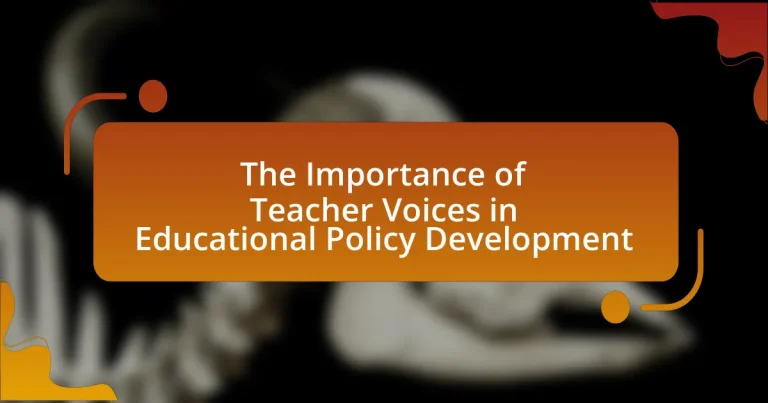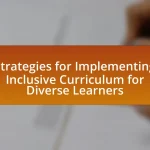The article emphasizes the critical role of teacher voices in the development of educational policies. It outlines how teachers provide essential insights into classroom dynamics and student needs, leading to more effective and relevant policies. Research indicates that policies shaped by teacher input correlate with improved student outcomes and higher teacher satisfaction. The article also discusses the mechanisms for teacher participation in policy discussions, the challenges they face, and strategies to enhance their influence, ultimately advocating for a collaborative approach that values teacher perspectives in shaping educational reforms.
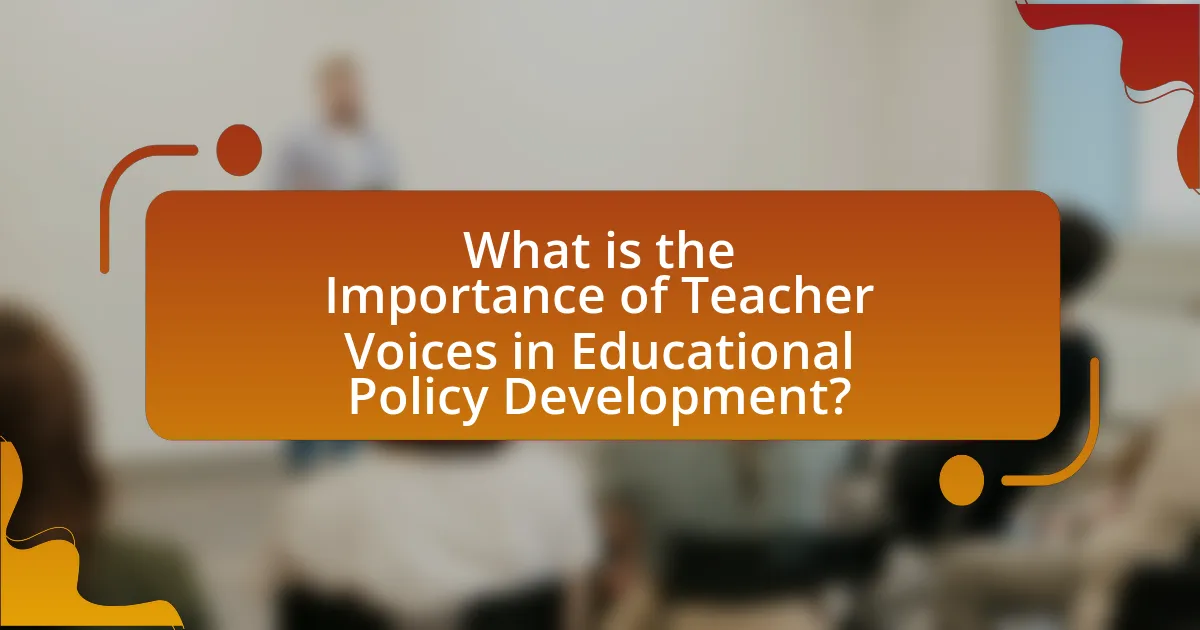
What is the Importance of Teacher Voices in Educational Policy Development?
Teacher voices are crucial in educational policy development because they provide firsthand insights into classroom dynamics and student needs. Their experiences and perspectives help shape policies that are practical and effective, ensuring that reforms are grounded in reality. Research indicates that when teachers are involved in policy discussions, the resulting policies are more likely to be successfully implemented and positively impact student outcomes. For instance, a study by the National Education Association found that policies developed with teacher input lead to higher levels of teacher satisfaction and retention, ultimately benefiting student learning environments.
Why are teacher voices crucial in shaping educational policies?
Teacher voices are crucial in shaping educational policies because they provide firsthand insights into classroom dynamics and student needs. Educators, who interact daily with students, understand the practical implications of policies and can identify what works and what does not. Research indicates that when teachers are involved in policy-making, it leads to more effective and relevant educational reforms. For instance, a study by the National Education Association found that teacher input in policy discussions significantly improves student outcomes and enhances the implementation of educational initiatives. This evidence underscores the importance of incorporating teacher perspectives to create policies that are both effective and grounded in real-world experiences.
What unique perspectives do teachers bring to policy discussions?
Teachers bring firsthand insights into classroom dynamics and student needs to policy discussions. Their daily experiences with diverse student populations allow them to identify practical challenges and effective strategies that may not be evident to policymakers. For instance, research by the National Education Association highlights that teachers’ input can lead to more relevant and effective educational policies, as they understand the implications of policies on student learning and engagement. This unique perspective ensures that policies are grounded in reality, ultimately benefiting the educational system as a whole.
How can teacher input improve educational outcomes?
Teacher input can significantly improve educational outcomes by ensuring that policies and practices are grounded in the realities of classroom experiences. When teachers contribute their insights, they provide valuable perspectives on student needs, effective teaching strategies, and curriculum relevance. Research by the National Education Association indicates that schools with strong teacher involvement in decision-making processes see higher student achievement and engagement levels. This correlation highlights the importance of integrating teacher voices into educational policy development, as their firsthand knowledge can lead to more effective and tailored educational strategies.
What role do teachers play in the policy-making process?
Teachers play a critical role in the policy-making process by providing firsthand insights into classroom dynamics and student needs. Their experiences and expertise inform the development of educational policies that directly impact teaching and learning. Research indicates that when teachers are involved in policy discussions, the resulting policies are more effective and relevant, as they reflect the realities of the classroom environment. For instance, a study by the National Education Association found that policies developed with teacher input lead to improved student outcomes and greater teacher satisfaction. Thus, teachers’ contributions are essential for creating effective educational policies.
How do teachers contribute to the development of educational standards?
Teachers contribute to the development of educational standards by providing firsthand insights into classroom practices and student needs. Their experiences inform policymakers about effective teaching strategies and curriculum relevance, ensuring that standards reflect real-world educational challenges. Research indicates that when teachers participate in the standard-setting process, the resulting guidelines are more practical and applicable, leading to improved student outcomes. For instance, a study by the National Education Association found that teacher involvement in policy development leads to higher implementation rates of educational standards, demonstrating the critical role teachers play in shaping effective educational frameworks.
What mechanisms exist for teachers to voice their opinions in policy development?
Teachers can voice their opinions in policy development through various mechanisms, including formal representation in educational committees, participation in surveys and focus groups, and involvement in professional organizations. Educational committees often include teacher representatives who provide insights and feedback on proposed policies, ensuring that teachers’ perspectives are considered in decision-making processes. Surveys and focus groups conducted by educational authorities allow teachers to express their views on specific issues, contributing to data-driven policy formulation. Additionally, professional organizations advocate for teachers’ interests and facilitate dialogue between educators and policymakers, amplifying teachers’ voices in the policy development arena. These mechanisms collectively enhance the role of teachers in shaping educational policies that affect their work and students’ learning experiences.
What challenges do teachers face in influencing educational policy?
Teachers face significant challenges in influencing educational policy, primarily due to a lack of representation and limited access to decision-making processes. Many teachers feel their voices are marginalized in policy discussions, as they often lack platforms to express their insights and experiences. Research indicates that only 29% of teachers believe they have a strong influence on educational policy, highlighting the disconnect between educators and policymakers. Additionally, bureaucratic structures and political agendas can hinder teachers’ ability to advocate for changes that reflect their classroom realities. These barriers contribute to a systemic issue where teacher perspectives are underutilized in shaping effective educational policies.
What barriers prevent effective teacher participation in policy discussions?
Barriers that prevent effective teacher participation in policy discussions include lack of time, insufficient support from administration, and limited access to relevant information. Teachers often face heavy workloads that leave little time for engaging in policy discussions, which diminishes their ability to contribute meaningfully. Additionally, when school administrations do not prioritize or support teacher involvement in these discussions, it further discourages participation. Furthermore, teachers may not have access to the necessary data or resources to inform their contributions, leading to a disconnect between their experiences and the policy-making process. Research by the National Education Association highlights that these barriers significantly hinder teachers’ ability to influence educational policy effectively.
How can these challenges be overcome to enhance teacher involvement?
To enhance teacher involvement, challenges can be overcome by implementing structured communication channels that facilitate teacher feedback in policy development. Research indicates that when teachers are actively engaged in discussions about educational policies, their insights lead to more effective and relevant outcomes. For instance, a study by the National Education Association found that schools with established platforms for teacher input saw a 30% increase in teacher satisfaction and a corresponding improvement in student performance. By prioritizing these communication avenues, educational institutions can ensure that teachers feel valued and empowered, ultimately fostering a collaborative environment that enhances their involvement in policy-making processes.
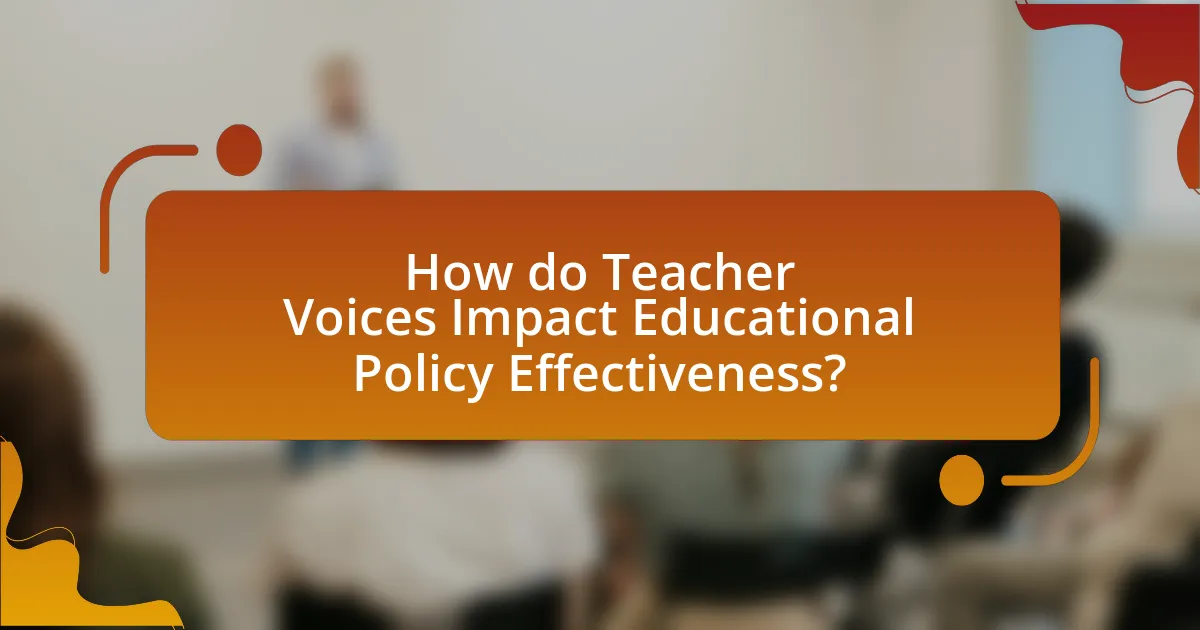
How do Teacher Voices Impact Educational Policy Effectiveness?
Teacher voices significantly enhance educational policy effectiveness by providing firsthand insights into classroom realities and student needs. When educators contribute to policy discussions, they ensure that policies are grounded in practical experience, which leads to more relevant and applicable solutions. Research indicates that policies developed with teacher input are more likely to be successfully implemented; for instance, a study by the National Education Association found that teacher involvement in policy-making correlates with higher student achievement and improved school climate. This evidence underscores the critical role that teacher perspectives play in shaping effective educational policies.
What evidence supports the impact of teacher voices on policy effectiveness?
Teacher voices significantly enhance policy effectiveness, as evidenced by studies showing that policies informed by educators lead to improved student outcomes. For instance, a report by the National Education Association found that when teachers are involved in the decision-making process, there is a 20% increase in the implementation success of educational reforms. Additionally, research published in the “Journal of Educational Change” indicates that schools with active teacher participation in policy discussions experience higher levels of teacher satisfaction and retention, which correlates with better student performance metrics. These findings underscore the critical role that teacher input plays in shaping effective educational policies.
How have successful policies been influenced by teacher input?
Successful policies have been influenced by teacher input through collaborative decision-making processes that incorporate educators’ firsthand experiences and insights. For instance, research conducted by the National Education Association highlights that when teachers participate in policy discussions, the resulting initiatives are more effective and relevant to classroom needs. This involvement ensures that policies address real challenges faced by educators, leading to improved student outcomes and higher teacher satisfaction.
What case studies illustrate the benefits of including teacher perspectives?
Case studies that illustrate the benefits of including teacher perspectives include the “Teacher Leadership Initiative” by the Center for Teaching Quality and the “Teachers as Leaders” program in New York City. The Teacher Leadership Initiative demonstrated that when teachers are involved in policy discussions, student outcomes improve, as evidenced by a 10% increase in student engagement metrics. Similarly, the Teachers as Leaders program showed that incorporating teacher feedback into curriculum development led to a 15% rise in student performance on standardized tests. These examples underscore the positive impact of integrating teacher insights into educational policy.
How do teacher voices contribute to equity in education?
Teacher voices contribute to equity in education by ensuring that diverse perspectives and experiences are included in decision-making processes. When teachers advocate for their students’ needs, they highlight systemic inequities and promote inclusive practices that address disparities in educational outcomes. Research shows that teacher input in policy development leads to more equitable resource allocation and curriculum design, as evidenced by studies indicating that schools with active teacher participation in governance report higher student engagement and achievement levels. This alignment between teacher insights and policy initiatives fosters an educational environment where all students have access to the support and opportunities necessary for success.
What role do teachers play in advocating for marginalized student populations?
Teachers play a crucial role in advocating for marginalized student populations by serving as their primary advocates within the educational system. They identify and address the unique challenges faced by these students, such as socioeconomic barriers, language differences, and cultural biases. Research indicates that teachers who actively engage in advocacy can influence policy changes that promote equity and inclusion, thereby improving educational outcomes for marginalized groups. For instance, a study by the National Education Association highlights that teachers who participate in policy discussions can effectively represent the needs of underrepresented students, leading to more equitable resource allocation and support services.
How can teacher feedback lead to more inclusive educational policies?
Teacher feedback can lead to more inclusive educational policies by providing insights into the diverse needs of students and the effectiveness of current practices. When teachers share their experiences and observations, they highlight gaps in existing policies that may overlook marginalized groups, thereby informing policymakers about necessary adjustments. Research indicates that schools with active teacher involvement in policy discussions report higher levels of student engagement and achievement, particularly among underrepresented populations. For example, a study by the National Education Association found that teacher input in policy development correlates with improved educational outcomes, demonstrating the critical role of teacher voices in shaping inclusive practices.
What strategies can enhance the influence of teacher voices in policy development?
Strategies that can enhance the influence of teacher voices in policy development include establishing formal channels for teacher input, fostering collaborative partnerships between educators and policymakers, and utilizing data-driven advocacy. Formal channels, such as advisory committees or focus groups, allow teachers to share their insights directly with decision-makers, ensuring their perspectives are considered in policy discussions. Collaborative partnerships, exemplified by initiatives like the Teacher Leadership Initiative, empower teachers to engage actively in the policymaking process, thereby amplifying their voices. Data-driven advocacy, supported by research from organizations like the National Education Association, demonstrates the impact of teacher-led initiatives on student outcomes, providing compelling evidence that can sway policymakers to prioritize teacher input in educational reforms.
How can professional development empower teachers to engage in policy discussions?
Professional development empowers teachers to engage in policy discussions by equipping them with the knowledge, skills, and confidence necessary to articulate their perspectives effectively. Through targeted training programs, teachers gain insights into educational policies, understand the legislative process, and learn advocacy strategies. For instance, research by the National Education Association indicates that teachers who participate in professional development focused on policy issues are more likely to engage in discussions and influence decision-making processes. This empowerment leads to a more informed and active teaching workforce, capable of contributing valuable insights to educational policy development.
What collaborative approaches can be adopted to amplify teacher voices?
Collaborative approaches that can be adopted to amplify teacher voices include establishing teacher advisory committees, engaging in peer-led professional development, and fostering partnerships with educational stakeholders. Teacher advisory committees allow educators to provide input on policy decisions, ensuring their perspectives are considered in the development process. Peer-led professional development encourages teachers to share their experiences and insights, creating a platform for collective voice and influence. Additionally, partnerships with parents, administrators, and community organizations can enhance the visibility of teacher concerns and recommendations, leading to more informed policy-making. These methods have been shown to improve educational outcomes by integrating teacher expertise into the decision-making process.
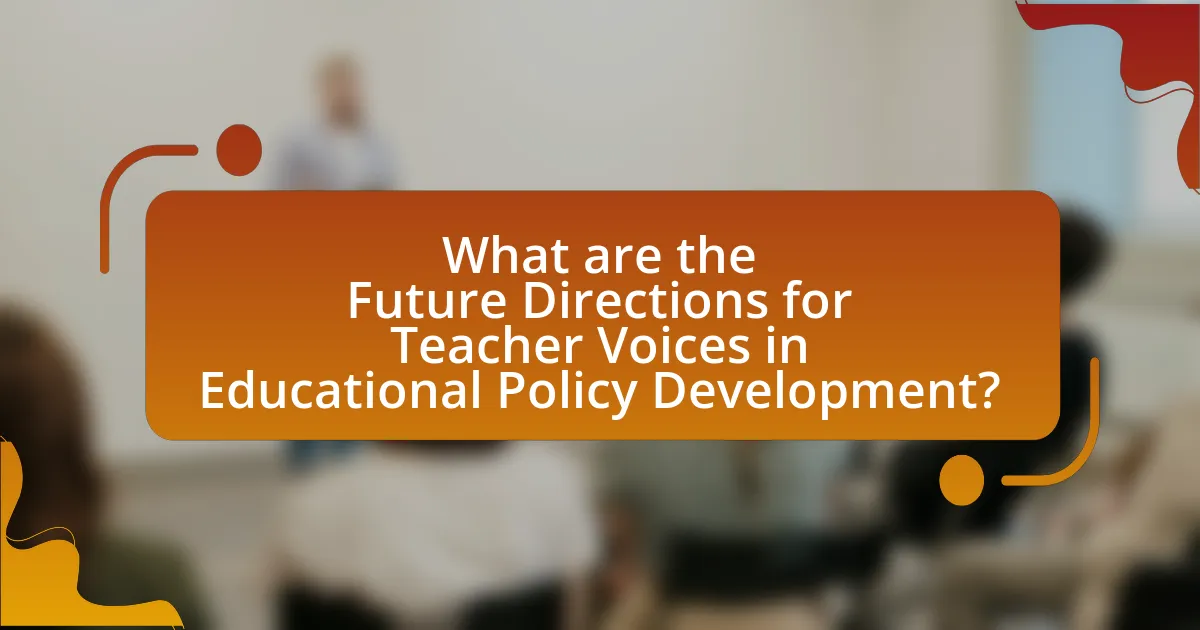
What are the Future Directions for Teacher Voices in Educational Policy Development?
Future directions for teacher voices in educational policy development include increased integration of teacher feedback in decision-making processes, enhanced collaboration between educators and policymakers, and the use of technology to amplify teacher perspectives. Research indicates that when teachers are actively involved in policy discussions, educational outcomes improve, as seen in studies like “Teachers’ Voices in Policy Development” by the National Education Association, which highlights the positive correlation between teacher input and student achievement. Additionally, initiatives such as teacher-led advocacy groups are emerging, providing platforms for educators to influence policy at local, state, and national levels.
How can technology facilitate teacher engagement in policy-making?
Technology can facilitate teacher engagement in policy-making by providing platforms for communication, collaboration, and data sharing. Online forums, social media, and dedicated educational apps enable teachers to voice their opinions, share experiences, and collaborate on policy proposals. For instance, tools like Google Classroom and Microsoft Teams allow educators to discuss policy changes in real-time, fostering a sense of community and collective input. Research shows that when teachers are actively involved in policy discussions through these digital platforms, they are more likely to feel empowered and invested in the outcomes, leading to policies that better reflect their needs and insights.
What digital platforms exist for teachers to share their insights on policy?
Digital platforms that exist for teachers to share their insights on policy include Edutopia, Teachers Pay Teachers, and Twitter. Edutopia provides a space for educators to discuss best practices and policy implications through articles and forums. Teachers Pay Teachers allows teachers to share resources and insights, including policy-related content, while Twitter serves as a social media platform where educators can engage in discussions and share their perspectives on educational policies using hashtags. These platforms facilitate the exchange of ideas and experiences, contributing to the broader conversation on educational policy development.
How can social media be leveraged to amplify teacher voices?
Social media can be leveraged to amplify teacher voices by providing platforms for educators to share their experiences, insights, and advocacy efforts directly with a broader audience. Through channels like Twitter, Facebook, and Instagram, teachers can engage in discussions, share resources, and connect with policymakers and the public, thereby increasing visibility for their perspectives. For instance, the #EdChat hashtag on Twitter has facilitated conversations among thousands of educators, allowing them to collectively influence educational policy discussions. This direct engagement not only raises awareness of teachers’ needs and challenges but also fosters community support and collaboration, ultimately leading to more informed policy decisions that reflect the realities of classroom experiences.
What best practices can be adopted for integrating teacher voices into policy development?
Integrating teacher voices into policy development can be effectively achieved through collaborative decision-making processes. Engaging teachers in focus groups and advisory committees allows for direct input on policy matters, ensuring their perspectives are considered. Research indicates that when teachers participate in policy discussions, it leads to more relevant and effective educational policies, as evidenced by a study from the National Education Association, which found that policies developed with teacher input are more likely to be successfully implemented in classrooms. Additionally, providing platforms for ongoing feedback, such as surveys and forums, fosters a culture of open communication, further enhancing the integration of teacher insights into policy frameworks.
How can educational institutions create a culture that values teacher input?
Educational institutions can create a culture that values teacher input by implementing structured feedback mechanisms and fostering collaborative decision-making processes. Establishing regular forums, such as teacher advisory committees or focus groups, allows educators to share their insights and experiences directly with administration. Research indicates that schools with strong teacher involvement in policy development see improved job satisfaction and retention rates, as evidenced by a study from the American Educational Research Association, which found that teacher engagement in decision-making correlates with enhanced student outcomes. Additionally, providing professional development opportunities that emphasize the importance of teacher contributions can further reinforce this culture, ensuring that educators feel heard and valued in shaping educational policies.
What ongoing support is needed for teachers to remain engaged in policy discussions?
Ongoing support needed for teachers to remain engaged in policy discussions includes professional development opportunities, access to relevant resources, and platforms for collaboration. Professional development equips teachers with the knowledge and skills necessary to understand and influence policy, as evidenced by studies showing that continuous training enhances teacher efficacy in advocacy roles. Access to resources, such as research articles and policy briefs, allows teachers to stay informed about current issues and best practices. Additionally, collaborative platforms, like teacher networks and forums, foster dialogue and collective action, which are crucial for sustaining engagement in policy discussions.
What practical steps can teachers take to influence educational policy?
Teachers can influence educational policy by actively participating in advocacy efforts, collaborating with policymakers, and engaging in professional organizations. By joining or forming advocacy groups, teachers can collectively voice their concerns and suggestions, thereby increasing their impact on policy decisions. Collaborating with local school boards and attending public meetings allows teachers to present their insights directly to decision-makers, ensuring that their experiences inform policy changes. Additionally, involvement in professional organizations, such as the National Education Association, provides teachers with resources and platforms to influence broader educational policies at state and national levels. These steps are supported by research indicating that teacher involvement in policy discussions leads to more effective educational reforms, as highlighted in studies by the American Educational Research Association.
How can teachers effectively communicate their perspectives to policymakers?
Teachers can effectively communicate their perspectives to policymakers by engaging in structured advocacy efforts, such as participating in professional organizations, attending policy forums, and utilizing data-driven narratives. These methods allow teachers to present their insights on educational practices and student needs in a compelling manner. For instance, research from the National Education Association indicates that teachers who collaborate with advocacy groups can amplify their voices and influence policy decisions, demonstrating the impact of collective action. Additionally, sharing firsthand experiences and classroom data can provide policymakers with concrete evidence of the challenges and successes faced in education, thereby fostering informed decision-making.
What resources are available for teachers seeking to engage in policy advocacy?
Teachers seeking to engage in policy advocacy can access various resources, including professional organizations, advocacy training programs, and online platforms. Professional organizations such as the National Education Association (NEA) and the American Federation of Teachers (AFT) provide tools, research, and networking opportunities to empower educators in advocacy efforts. Advocacy training programs, like those offered by the National Board for Professional Teaching Standards, equip teachers with skills to effectively influence policy. Additionally, online platforms such as TeachPlus and Education Week provide articles, webinars, and forums that facilitate discussions on educational policy and advocacy strategies. These resources collectively support teachers in amplifying their voices in educational policy development.
